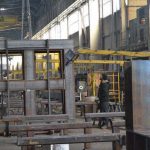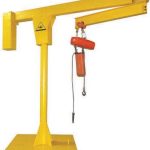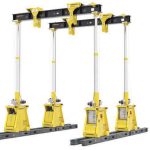Product development is ongoing in the US lifting equipment sector. We spoke to some of the manufacturers in the sector about their latest innovations, and their plans for the year.
Air Technical Industries (ATI) has launched its new Portable Jib Crane Articularm, a 360° rotating portable jib crane with articulating forearm and telescopic mast. Its main benefit is portability, says ATI: it can be used anywhere, indoor or outdoor, without permanent installation. It can also operate in collaboration with overhead cranes.
The 360° rotation of the 6ft-long articulating forearm provides full coverage within the work area, while the 10ft main beam also offers full rotation, providing a total working radius of 16ft. To improve ergonomics, it can be fitted with an optional load balancer to make the load ‘weightless’ to the operator. It’s suitable for many industrial applications including machine loading, lifting, transferring,
stacking, packing, holding parts for inspection, assembly, and maintenance. The system is available in three versions: a unit with a stationary, permanent floormounted arm; a portable, self-supporting counterweight jib crane with four-way fork pockets; and a combination unit with telescopic mast. The telescoping mast can be used for actual load lifting without use of a hoist, says the company, as well as being useful for reducing the overall height of the crane for storage or transportation, or for use in confined headroom or higher ceiling heights. The lifting action is hydraulically actuated. Capacities are 500, 1,000 and 2,000lbs, with beam heights of 8, 10, 12, 16 and 20ft.
Demand in the US market is focused on ergonomics ahead of digitalisation, says Vida Novak at ATI: “Our projections on the US market for 2019 are strong, steady, but with mild growth. Demand for material handling equipment is excellent, with plants continuing to modernize their systems and processes to remain competitive.
“More attention is being focused on ergonomics challenges, with customers implementing work positioning or lift assist equipment for smaller and lighter loads than ever. It’s no longer a matter of having a piece of equipment to lift something when there is no other way, but companies are finding the value in reducing back strain and repetitive motions, even when they are within weights that might traditionally be handled manually.
“The focus on productivity and efficiency remains process-oriented and we have not found a huge demand for industrial internet of things or connected devices for monitoring or measuring the equipment. The technology is growing, but adoption remains rare. I’m sure I could be proven wrong comparing against some ultra-modern facilities, however by and large the focus appears to be on getting the job done safety and efficiently rather than making sure you can check the status or turn it on with your smartphone.”
Sippel Steel Fab, a structural steel fabrication plant located in Ambridge, Pennsylvania purchased 15 Cervis Warrior Console Box (Warrior CB) systems in 2018, with a further nine in process.
The Warrior CB is typically used in applications of Class C and above. It can link up with several receivers, enabling expanded machine control, and offers radio frequency connectivity between hoists. Cervis is currently customising the Warrior CB range for newly-manufactured cranes, crane modernisation programmes and general upgrade kits, and the replacement of existing or new service applications.
Tim Shank, plant maintenance manager at Sippel Steel, said the Warrior CBs require fewer battery changes. He adds, “Damage to cases, handles and levers are common in the workplace, but these units are very durable.
“The Warrior systems have reduced the maintenance labour and cost required to manage 15 radio systems. If the radio transmitter should need replacing, the simple association process for adding a spare can have the radio running within a minute or two.”
Product development is ongoing in the US lifting equipment sector



没有评论:
发表评论